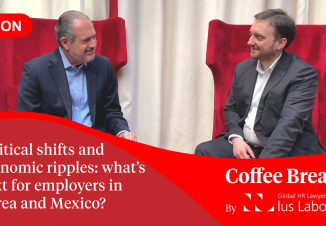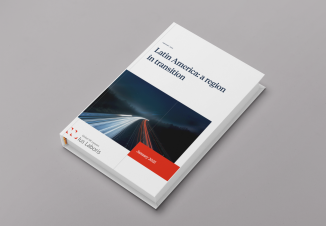
The impact mobile technology is having on society is creating major challenges for regulators around the globe. The speed of technological change has also given rise to new types of work that cannot be addressed through current labour legislation, especially for those working in the gig economy.
The gig economy, also known as the “on demand” or “sharing economy”, has had a dramatic impact not only on how people work, but also on how employers engage with their employees. Indeed, the changes in business models and working styles brought about by rapid technological advances have created numerous issues across the globe as regulators try to keep up with the pace of change.
Argentina
Over the past three years, multinational tech start-ups and companies such as Uber, Glovo and Rappi arrived in Argentina, which led to many labour conflicts and claims that remain unsolved partly due to the lack of specific regulation applicable to their business models.
Uber has been at the forefront of employment-related issues triggered by the gig economy across the world. When it came to Argentina in 2016, there were endless conflicts with taxi drivers and taxi drivers’ unions who considered the company was acting illegally by not complying with existing public transport regulations, which constituted unfair competition.
Since then, there have been street protests and acts of violence, including the destruction of vehicles providing Uber services. Unions and associations of taxi drivers and societies of owners of taxis also submitted a legal complaint against the local government in Buenos Aires. They argued that Uber’s activity was not compliant and requested the suspension of its activities in the city. Their claim was successful.
Due to the lack of reaction from national governments, various cities have begun taking their own stance against Uber. It has now been regulated at a national level in Brazil and locally in Mexico.
In Argentina, Mendoza was the first city to regulate Uber’s activities. The law expressly recognises transport between private users through digital platforms as a new, different and complementary category to existing ones.
Owners of vehicles providing these services must request an exploitation permit from the Application Authority, which is revocable.
Registered permit holders will be linked with passengers through Transport Network Companies (ERTs), legal entities that promote or encourage the use of their own technologies or applications or third parties that allow users to access the Platform Transportation System Electronics through a mobile device that uses a global positioning system.
The Application Authority may limit the maximum number of vehicles used or areas where they may operate. The amount that users must pay for providing services will be set by the transport network company.
Drivers can provide services only when there are applications that have been accepted or processed through electronic platforms. There are now a series of obligations that permit holders and companies of private transport must follow using electronic platforms.
In Argentina, there is no case law precedent where Uber drivers have made a claim against the company to be considered as employees and not contractors. Other online platform companies currently operating in Argentina include Rappi and Glovo, both of which provide delivery services. Rappi claim to have between 4,000 and 5,000 delivery collaborators, ”rappitenders”, who complete at least one order per month while Glovo claim that they have about 8000 active ”glovers”.
According to both companies, their ”collaborators” have “the freedom to work when they want, as long as they want” and do not consider them to be employees in an employment relationship. They do not have a fixed salary, health insurance, bonuses, paid holidays, or employer pension contributions.
However, one of the main legal problems that both companies could face by not officially employing their “collaborators” is linked to the lack of cover in the event of accidents or work-related risks. Despite this, there have not yet been any jurisprudential rulings requiring Glovo or Rappy to register their “collaborators” as employees.
PedidosYa, another online platform system that delivers food, seems to be the only exception as they consider their riders to be employees in compliance with Argentine employment law.
It should be noted that self-employed workers from Uber, Rappi and Glovo registered the first digital platforms union (APP) with the Ministry of Labour. It is likely that claims by workers of these companies in Argentina will intensify in 2019.
Undoubtedly, new economic activity generated by the development of new technologies will require its own regulations adapted to new economic and social realities. Argentine employment law dates back to 1974 and numerous collective bargaining agreements (CBAs) are now 40 years old.
A possible amendment to labour employment law could incorporate a new intermediate term between the traditional definitions of employee and self-employed worker in accordance with the positions adopted by Spain, Canada, Slovenia or Austria.
Undoubtedly the most appropriate area for a solution that adapts to the characteristics of each type of activity is Collective Bargaining Agreements (CBAs), where chambers of commerce and workers’ unions (assisted by the Secretary of Employment) could find solutions adapted to the new realities and needs that are generated by the rise of new technologies.
Unfortunately, due to the resistance of Argentine trade union associations and the lack of political support from opposition parties in Congress, an Argentine employment law reform has been postponed for more than a year.
In January 2019, several newspapers reported that two main reforms will soon be sent to Congress by the government; however, they do not relate to the impact of the gig economy on the labour market. One of the main reforms proposed relates to the regularisation of unregistered employees. Under the proposed reform, employers will have to register their employees within one year of the regulation coming into force.
The reform establishes a period of approximately one year for regularisation, during the initial 180 days at zero cost for the employer in social security liabilities and the following 180 days attracting a deduction of 70%. The remaining debt could be cancelled in a facility plan of up to 60 monthly instalments with an interest rate of 0.75% per month.
If the employer does not register their employees in the social security system, there is no contribution from either the company or the employee. Any years of unregistered work will not be taken into consideration when the employee applies for his or her pension.
Under the proposed reforms, the Social Security System will recognise any unregistered employee for up to 60 months as a maximum contribution period or less depending on their seniority. This proposal seeks to address one of the biggest problems of the Argentine labour market, where unregistered employment was estimated at 34%.
The second reform seeks to promote new employment relationships. During the one-year period, employers who hire new employees will be exempt from contributions to the Argentinean Pension System during the first two years of any new employment relationship.
While the government seeks to introduce measures to incorporate unregistered employees into the labour market and provide legal security for companies to boost economic activity, opposition parties are proposing a law that duplicates severance payments in cases of unfair dismissal.
Brazil
While the Brazilian labour reform in 2017 introduced some flexibility into the legal framework for employment, it did not address the impact of new technologies in the labour market. As a result, Uber and other online platforms could be subject to employment claims for misclassified employees.
The list of negotiable matters had been expanded, some through collective agreements, some through individual agreements. However, the reform has two major problems.
One is the imbalance it created between the incremental number of negotiable work conditions and the suppression of the mandatory union fee, the unions’ main source of funding. Union fees used to be mandatory for all workers, even non-unionised ones. Following the reform, they are optional, creating a financial disaster for the unions because nobody wants to pay.
For employers, there are two main issues arising from this impasse. Firstly, CBAs are necessary for many post-reform legal innovations in managing the workforce. However, many unions are incapable or unwilling to engage in collective negotiations due to a fall in revenue. Secondly, some unions managed to convince their counterparts, the industry associations, to stipulate that companies will pay unions a fee for the negotiation of the CBA. Although unions are not public agents, such a payment may pose a challenge to ethics and compliance programmes because it may be treated as a quid pro quo.
An amendment to solve the union fee impasse seems unlikely. Former President Michel Temer attempted this without success. The only solution seems to be a multilateral compromise between workers, unions, companies, industry associations, the government and the courts to set up a new mechanism to fund collective negotiations that do not pose a conflict of interest.
The other problem with the reform is that some of its content remains extremely controversial and possibly creates conflicts with provisions in the constitution. The Supreme Court is already dealing with some class actions or public civil actions against certain parts of the reform, such as new rules concerning court fees due by employees, voluntary union fees (restoration of the mandatory fee) and intermittent work.
Intermittent work is a new form of employment whereby a permanent employee works on demand and is paid accordingly. It is aimed at addressing the traditional problem of informal workers on short-term assignments and projects but on a recurring basis (it is, therefore, different from the status of temporary workers). There is one case that illustrates how the reform has affected litigation. A major retail company immediately embraced intermittent employment to increase the number of sales assistants in their stores. Some workers took their cases to court and eventually prevailed in having their contracts treated as full-time employment.
On the regulatory side, the recently elected President Jair Bolsonaro faces his first challenge: fulfilling his campaign promise of reforming the social security system. The legislative bill proposed by the presidency increases the age and minimum period for pension contributions for some categories. It also proposes changes to the calculation of pensions based on contributions. The most controversial issue, however, is the transitional rules, which need to balance the need for effective change with acquired rights.
The social security reform is expected to attract new long-term investments into Brazil and to revamp the local economy by showing social stability and balanced public accounts. Political analysts say it is impossible to pass it through the bicameral congress before mid-year; however, approval itself is still in doubt due to conflicts of interest. Public servants’ pensions correspond to their salaries, while workers’ pensions are capped. Politicians earn a pension by serving merely one legislative term. Companies make a substantial contribution to social security (28% of payroll) and say there is no room for extra funding. In fact, the increase in payroll social security costs would make Brazil a less competitive place for production. One of President Bolsonaro’s campaign promises was to refuse the traditional political bargain of public positions for political support. So how will he secure support for his proposal? Will popular pressure help him? Will Congress understand that changing the pension system is necessary for the good of the country?
There are too many questions and still no clarity ahead.
Mexico
On 22 December 2018, a bill to amend and partially repeal several provisions of the Mexican Federal Labour Law was submitted by the parliamentary group of the political party Morena to the Federal Congress.
The bill acknowledges and adopts principles and guidelines set forth in:
There are two main areas of uncertainty deriving from the above.
The first is the implementation of the constitutional amendments to the Mexican labour justice system by which current Conciliation and Arbitration Labour Boards (administrative agencies currently charged with resolving labour disputes) are replaced by Labour Courts, which will be incorporated directly into the judiciary system (federal or state).
The implementation of the constitutional amendments has not been initiated despite having a deadline of 24 February 2018, which is creating uncertainty not only for employees and employers, but also for government officials currently working in the Labour Boards who have no assurance of whether their role will be maintained when the labour justice reform is implemented. Moreover, there is the uncertainty that comes with having two legal dispute resolution systems: Labour Boards and Courts with different proceedings and trial rules.
The second area of uncertainty relates to collective bargaining, as the USMCA includes a commitment from Mexico to pass laws that give workers the right to real union representation and freedom of association. This is relevant, as unlike NAFTA, the new USMCA allows each country to sanction the others for labour violations that affect trade.
Both President Andres Manuel Lopez Obrador and Luisa Maria Alcalde, Secretary of Labour, have been open about democracy in unions and transparency in unionised life throughout the country.
Employers will have to look at encouraging open and active union engagement in the workplace. Real unionised employment has proven to be successful when employers and employees understand that unions and employers should not operate as rivals but as allies to the benefit of all parties. In the meantime, there remains little certainty for companies and employees as to how these new labour challenges will be addressed, and the amendment bill project is enacted into law.
Conclusion
Although the changes introduced by new technologies in the workplace demand a legal response from national states, this issue is currently not on the legislative agenda of the Argentinian, Brazilian and Mexican governments.
The main priority in Argentina is to boost its economy, with reforms proposed by the national government to reduce unemployment (9% according to Indec by the third trimester of 2018) and reduce the informal labour market (estimated at 34.3%).
In Brazil, the employment law reform of 2017 and the recently announced pension law reform (February 2019) seek to attract international investment with some signs of economic recovery.
In Mexico, the employment law reform is addressing a change in its judicial system and a recognition of employees’ rights to real union representation and freedom of association.
Trade union associations have a strong presence and history in Argentina, Brazil and Mexico. Developing a constructive relationship between trade unions and employers through CBAs will be a crucial instrument to adapt obsolete employment laws or CBAs to current needs and employment practice models modified by the new technology revolution.
Today, more than ever, social dialogue between government representatives, employers and workers is essential in the search for consensus and agreements that can give an effective and productive response to the new challenges that each nation is currently facing.
The online link to the article can be found here.


